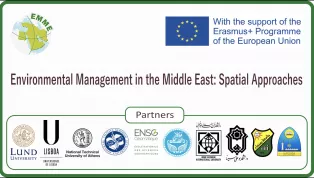EMME: Environmental Management in the Middle East
Funding agencies: European Commission and Erasmus+ CBHE. Duration: 2018-2021
This project aims at capacity building on the use of spatial data infrastructures and underlaying technologies to improve environmental management in the Middle East. Spatial focus is on Yemen which is facing several issues in the region.
Climate change, misuse of environmental resources (e.g., overuse of groundwater) and environmental interventions (e.g., dam construction without proper environmental impact assessment) are important challenges in the Middle East. Furthermore, the deteriorating situation for fresh water, sanitation and waste treatment, and the effects on health and food security, are increasing the demand for international aid to the region. Spatial Data Infrastructures and underlying Technologies (SDI-T), including Geographical Information Systems (GIS) and Remote Sensing (RS), have proven to be crucial for environmental management (EM). However, capacities to use SDI-T for environmental management in the Middle East is limited.
GIS can be used to model trends, identify hotspots, analyze and simulate measures to protect the environment and mitigate the effects of crisis. RS, mainly through satellite images, can be used to e.g. monitor environmental changes like land degradation and water levels. An SDI is required to overcome the technical and conceptual barriers in sharing heterogeneous spatial data to support collaborative decision making. Different sources of data, GIS software components, spatial DB, and analysis tools, can be combined in an SDI to provide integrated environmental modelling for the Middle East. Although SDI-T has proven to be a very useful tool to improve environmental management, it is not still used by the authorities in the Middle East, largely because of lack of capacity and knowledge.
Objectives
Capacity building on applications of SDI-T for knowledge-based environmental management is the main aim of the project. Specific objectives are:
- Development of innovative blended courses
- Development of web-based tools to facilitate data collection, analysis and sharing in an interoperable environment.
- Establishing e-learning systems in the university partner countries
- Training of pilot students
- Training of trainers
- Joint research studies
- Dissemination of results
Publications
Ahangar Cani, M., Farnaghi, M., Shirzadi, M.R., Mansourian, A. (2019). "Predictive Risk Mapping of Human Leptospirosis using Support Vector Machine and Multilayer Perceptron", Geospatial Health, 14:711.
Jeihouni, M., Toomanian, A., Mansourian, A. (2020). "Decision Tree-Based Data Mining and Rule Induction for Identifying High Quality Groundwater Zones to Water Supply Management: a Novel Hybrid Use of Data Mining and GIS", Water Resource Management, 34: 139-154.
Mansourian, A., Matchanov, M., Farnaghi, M., Pilesjö, P. (In press). "iMSEP: a GIT-based digital solution for disaster management." in Hydro-Meteorological Hazards, Risks and Disasters (in press), Elsevier.
Masoumi, Z., Coello Coello, C.A., Mansourian, A. (2019). "Dynamic Urban Land-Use Change Management using Multi-Objective Evolutionary Algorithms", Soft Computing, 24: 4165–4190.
Omidipoor, M., Toomanian, A., Neisani Samani, N., Mansourian, A. (2021). "Knowledge Discovery Web Service for Spatial Data Infrastructures", International Journal of Geo-Information, 10(1):12
Research Team
Ali Mansourian, CMES Researcher and Associate Professor at the Department of Physical Geography and Ecosystem Science (Lund University)
ali [dot] mansourian [at] nateko [dot] lu [dot] se (ali[dot]mansourian[at]nateko[dot]lu[dot]se)
Petter Pilesjö, Professor at the Centre for Geographical Information Systems (GIS Centre, Lund University)
petter [dot] pilesjo [at] gis [dot] lu [dot] se (petter[dot]pilesjo[at]gis[dot]lu[dot]se)
Mohammed Almahfali, CMES Visiting Research Fellow (Lund University)
mohammed [dot] almahfali [at] cme [dot] lu [dot] se (mohammed[dot]almahfali[at]cme[dot]lu[dot]se)
Micael Runnström, Senior Lecturer at the Centre for Geographical Information Systems (GIS Centre, Lund University)
micael [dot] runnstrom [at] gis [dot] lu [dot] se (micael[dot]runnstrom[at]gis[dot]lu[dot]se)
David Tenenbaum, Professor at the Department of Physical Geography and Ecosystem Science (Lund University)
david [dot] tenenbaum [at] nateko [dot] lu [dot] se (david[dot]tenenbaum[at]nateko[dot]lu[dot]se)
Lisbon University (UL) in Portugal
National Technical University of Athens (NTUA) in Greece
Vilnius Gediminas Technical University (VGTU) in Lithuania
Ecole nationale des sciences géographiques (ENSG) in France
University of Tehran (UT) in Iran
Imam Khomeini International University (IKIU) in Iran
Bu-Ali Sina University (BASU) in Iran
Sana’a University (SU) in Yemen
Taiz University (TU) in Yemen
EMME Website
External Project Website
EMME on Facebook
Project Facebook Page


